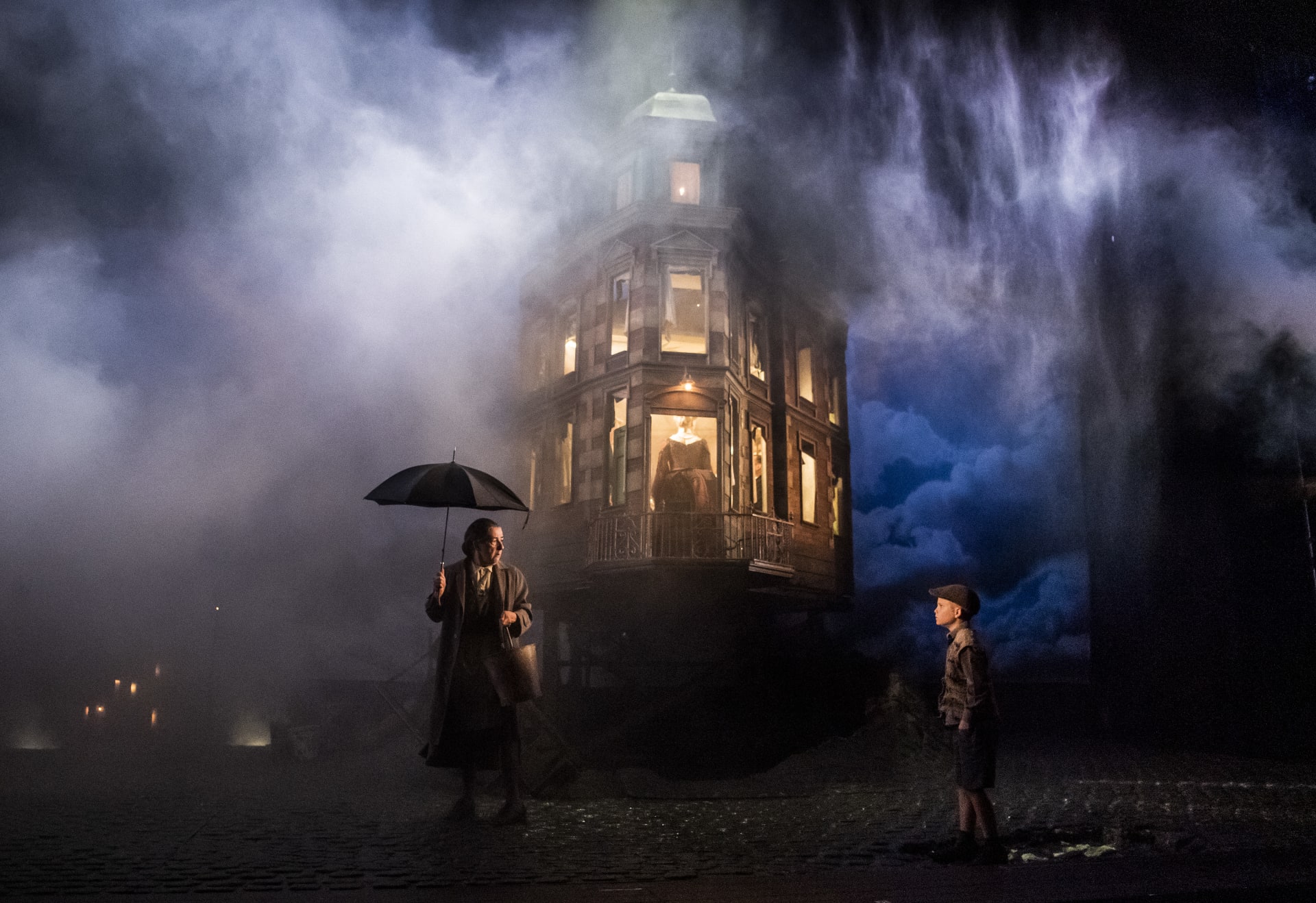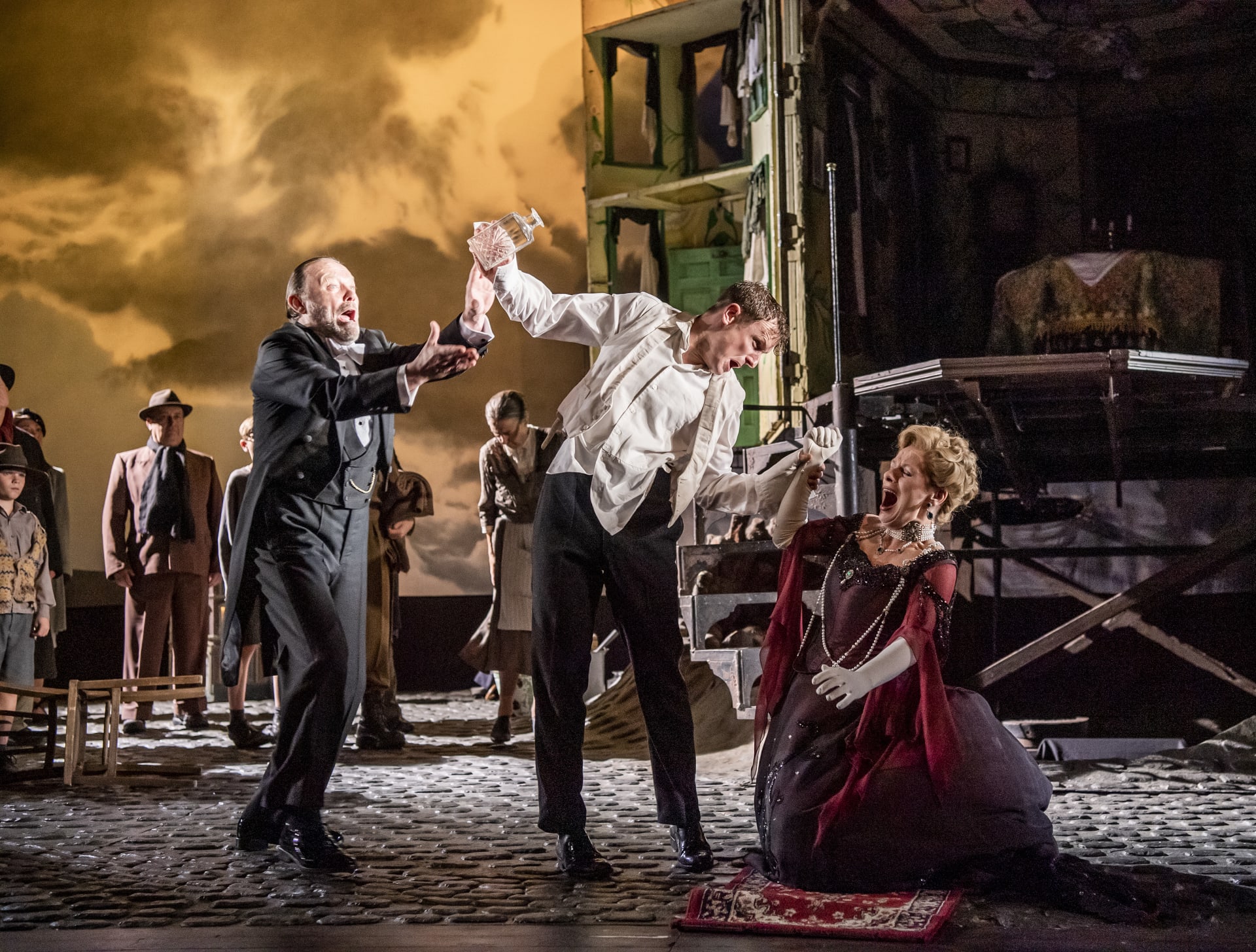A timely reminder in the run up to World Kindness Day
An Inspector Calls takes place in one night in 1912 in the fictional north Midlands town of Brumley. We meet the Birling family – Arthur (Jeffrey Harmer), his wife Sybil (Christine Kavanagh) and their children Sheila (Chloe Orrock) and Eric (Ryan Saunders) – during their celebration of Sheila’s engagement to Gerald Croft (Alasdair Buchan), heir to the Crofts Ltd fortune. Their port-soaked guffawing is interrupted, however, at the arrival of Inspector Goole (Liam Brennan).
The inspector claims to have just come from the infirmary, where he witnessed the gruesome suicide of a working-class woman called Eva Smith. Through Goole’s inquiries, we discover that each person present had some interaction with her: Arthur fired her from his mill after she took part in a failed workers’ strike; Sheila had her sacked from her next job at a department store after she witnessed her give an apparently impertinent look; Gerald recognises her alias, Daisy Renton, and admits to their having had an affair, before abruptly cutting her off emotionally and financially; Sybil recognises Eva as a pregnant and destitute woman to whom she, as the head of a local charity, refused aid; and finally, Eric, admits to being a drunk and to having raped and impregnated her before stealing money from the family business to support her – money she refused prior to seeking help from Sybil’s charity.
After Goole leaves, Gerald realises that they have no proof that he was bona fide. They call the chief inspector and discover that there’s no one by the name of Goole on the force. They call the infirmary and learn that there have been no recent cases of suicide. The elder Birlings and Gerald rejoice, believing it to be an elaborate hoax carried out by an industrial rival. Eric and Sheila’s guilt remains and their father taunts them with, ‘Now look at the pair of them – the famous younger generation who know it all. And they can’t even take a joke.’ He’s cut off by the phone ringing. It’s the police. They tell them that a girl has died by suicide and that they’re on their way to question them all.
It’s almost impossible to imagine this piece with any other staging than that of Stephen Daldry’s celebrated 1992 revival, which saw Ian MacNeil’s design win awards on both sides of the Atlantic. The Birlings’ house is on stilts, warmly lit inside but shrouded in rain, mist and smoke. The opening celebration happens behind closed doors and we hear only sporadic snippets of conversation, enforcing the sense of class separation. The house swings open as the family defend themselves from Goole’s inquiries, before eventually toppling towards the audience with a crash, sending silverware tumbling to the stage. This gives muscle and sinew to the Birlings’ moral reckoning. Their privacy, control and supremacy is figuratively and literally dismantled, leaving them scrabbling in the dirt.
All the characters pull their weight in making us wish to see justice done, teeing up the moral punchline. Jeffrey Harmer and Christine Kavanagh are very convincing as the progressively garish Arthur and Sybil, especially contrasted with Liam Brennan’s Goole, played with imperious dignity and authority. Ryan Saunders gives the strongest performance of the night as Eric. He begins as the skittish son, keen to please and impress his father, and ends utterly dejected and distraught. His confrontation with his parents is the dramatic highlight of the evening.
In many ways, An Inspector Calls is a dramatic manifestation of John Donne’s famous injunction that ‘No man is an island.’ The Birlings are all too quick to evade accountability when it is their combined selfishness, greed and malice, rather than any one act, which pushed Eva to the edge. JB Priestley is arguing, occasionally a little clunkily it must be said, that our first duty is to one another; that the welfare of community ought to always supersede the wealth of individuals. There’s a sort of moral inevitability to it all – again echoing Donne – as if we behave like we aren’t interrelated, that we aren’t on some level responsible for one another, the eventual degradation of the whole will spare no one – ‘And therefore never send to know for whom the bell tolls; it tolls for thee.’
The play is principally a case for social welfarism. Indeed, while Goole acts as a kind of omnipotent avenging moral agent, it’s not so much the individuals he battles, but their infatuation with and weaponisation of money and status. When Arthur discovers that Eric stole from the company, his rage eclipses the moral disgrace that his son is an alcoholic rapist. It’s Shelia’s threat that she’ll close their account at the shop that gets Eva fired, and once Gerald and Sheila’s engagement is destroyed by knowledge of the affair, Arthur is more concerned about the future merger of his company with Crofts Ltd than about his daughter’s broken heart.
It’s telling that Goole barely accuses anyone. He only has to peek under a veneer of respectability before their stature unravels. In this way Priestley shows how class can be a sort of wilful, self-aggrandising delusion. Four times throughout the story’s slow descent we hear that Arthur was Lord Mayor ‘only two years ago’. It’s mentioned first to assuage the concerns of Sir and Lady Croft that Sheila isn’t sufficiently high on the social food chain to deserve Gerald, and then to evade, threaten, and rebuke the unrelenting inspector. Priestley is mocking this fetish for titles as if it’s a life raft to which the privileged must cling ever tighter as they feel increasingly threatened. The new/old money disparity between Arthur and Gerald becomes absurd when eventually seen against the wider gulf between them and the likes of Eva. Theirs is the narcissism of small differences.
Priestley wrote An Inspector Calls in 1945 and it premiered in Moscow the day after the general election that brought a surprise landslide for Clement Attlee’s Labour Party. Attlee was then to embark on the construction of the welfare state, the likes of which would have saved Eva at every stage of her incremental destitution. Priestley’s communitarian sensibilities stretch from his prognosis of an unequal society to a diagnosis for the war he’d just lived through, and the one his characters are two years away from. Unrestrained capitalism, disregard for workers and steep social inequality are ingredients for war, as Goole warns, ‘If men will not learn that lesson, then they will be taught it in fire and blood and anguish.’
I left with a much more mild, but no less profound lesson; that kindness is free. Though it’s a little trite to paint our world onto Priestley’s, one can’t really help it. We live in trying times. It feels as though our public discourse has been evacuated of its empathy, drained of its decency and worst of all, it’s not clear what anyone can do about it. But Priestley reminds us that we have a choice. We can all elect to inject sympathy into the world, to compound kindness and have faith in it as an end in itself. We just have to try.










